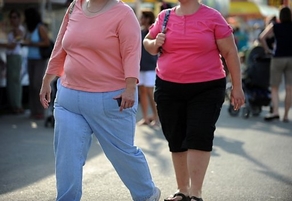
PARIS (AFP) – Obese women are likelier to neglect contraception, obese men are more prone to impotence and both are far less sexually active than counterparts of normal weight, a study said on Wednesday.
The findings highlight “a major reproductive health challenge,” requiring doctors to pierce the twin taboos of obesity and sex, it said.
The research covered 10,170 men and women aged 18-69 whose data was randomly chosen from a French survey of sexual behaviour carried out in 2006.
Around two-thirds were of normal weight, a quarter were overweight and the remainder (411 women and 350 men) were obese.
Overweight was defined by having a body mass index (BMI) of between 25 and 30, and obesity as a BMI of at least 30.
Obese women were 29 percent less likely to have had a sex partner in the previous 12 months, compared with women of normal weight.
Obese men were 69 percent less likely to report having more than one sexual partner in the same period and two and a half times likelier to report erection problems than non-obese counterparts. Obese men under 30 were also far likelier to have a sexually-transmitted disease.
Sexual dysfunction — lack of desire or arousal or pain in intercourse — was not a problem for obese women.
However, those under 30 were far likelier not to use contraception or to seek contraceptive advice. Unintended pregnancies among obese women were more than four times higher than among women of normal weight.
That discovery is especially worrying, as obesity is a major factor in mother and infant death and sickness.
The study, published online by the British Medical Journal (BMJ), was headed by Nathalie Bajos of the National Institute of Health and Medical Research (Inserm) in Paris.
In a commentary published by the BMJ, Sandy Goldbeck-Wood, a British gynaecologist specialising in psychosexual medicine, said the findings should ring alarm bells, given the unfurling global epidemic of obesity.
“In public health terms, the study lends a new slant to a familiar message: that obesity can harm not only health and longevity, but your sex life. And culturally, it reminds us clinicians and researchers to look at the subjects we find difficult.”
BMI is derived by dividing one’s weight in kilograms by the square of one’s height in metres. Using Imperial or US measurements, it is one’s weight in pounds multiplied by 703, and then divided by the square of one’s height in inches.